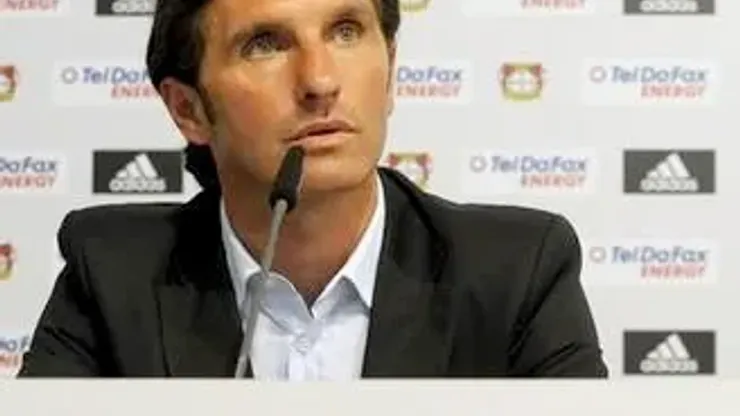
In his near 20-year long playing career he traveled the breadth of Germany from Kaiserslautern to Cologne (Köln) to Karlsruhe (and some cities not beginning with K, too). From 1991 to 1994 he played for Bayern München, making him the third manager profiled (alongside Klinsmann and Jol) to have played for the Bavarian giants. Interestingly enough he is the only player to have scored at least 100 goals in both the 1. (104) and 2. (101) Bundesliga. That’s quite an achievement for one’s resume, so immediately after hanging up his boots in 2003 he was hired as a manager.
He made his debut on the sidelines of SV Darmstadt 98, in the same stadium where he made his professional debut in 1984. He performed well enough in his three seasons with die Lillien (the lilies) to be offered a position with die Kleeblätter (the cloverleaves) of SpVgg Greuther Fürth, a step up in both footballing and taxonomic class. In his one year at Fürth Labbadia did little to upset the delicate equilibrium in place, keeping the club in its vexing “almost, but not quite promoted” table position (placing 6th last year and 5th the previous three). Not prepared to take part in the Germany’s most-played rivalry (the Frankenderby) with the relegation of 1. FC Nürnberg last season, Labbadia instead became Bayer Leverkusen’s 24th manager. He enters a fairly stable environment at the BayArena, although questions about the team’s strikers must be addressed before the team can seriously consider its first Bundesliga championship.
Dimitar Berbatov was the team’s last out and out striker, scoring 57 goals his last three years at the club. His move to Tottenham for 16 million Euros in 2006 left a void that has yet to be adequately filled. No Leverkusen striker remaining inspires much confidence. Patrick Helmes and Richard Sukuta-Pasu are still inexperienced, although Helmes did well in the 2. Bundesliga with Cologne and Sukuta-Pasu had an excellent UEFA U-19 tournament. The rest: Theofanis Gekas, Stefan Kiessling, Dmitri Bulykin are all older, but also relative newcomers to the club. None has stepped forward to take over Berbatov’s mantle. That is rather important because…
Leverkusen are consistent European competitors, except for the occasional unexpected blip caused by a marked decline in offensive output. If the trend holds (though there’s no reason to actually call it a trend) Leverkusen’s due for a fall soon. Each of the previous dismal seasons (1995/96 and 2002/03) were marked by lackluster offensive showings of 37 and 47 goals respectively. In all other seasons going back to 1990/91 Leverkusen have scored at least 50 goals and have placed no worse than 7th. The previous two seasons they’ve managed to scrape by with low topscorers, but that can’t last. Bernd Schneider can’t continue to provide goals and inspiration from the midfield at his age (he turns 35 this November). Labbadia must either find a true predator on the transfer market or hope that he is able to mold one of his current players into one, otherwise things look grim.
—
While this brings an end to the series itself there is one bonus tidbit as promised last week: a brief look at managerial changes in the Bundesliga over the years. Every 2008/09 Bundesliga club is listed except for Cottbus and Hoffenheim. Cottbus, as a former GDR side, and Hoffenheim, with their meteoric rise, would skew the numbers (also, it was impossible to find the information for either covering the 45-year time period).
Bundesliga-era number of coaches (teams with new trainers in bold)*:
Bielefeld: 42
Bayern: 20
Bochum: 18
Bremen: 25
Cologne: 37
Dortmund: 40
Frankfurt: 36
Hamburg: 26
Hannover: 45
Hertha: 33
Karlsruhe: 27
Leverkusen: 24
Mönchengladbach: 21
Schalke: 38
Stuttgart: 35
Wolfsburg: 24
Bayern’s long-term dominance skews the statistics, but a pattern is discernible. My initial, unoriginal, thought that the number of trainers is inversely related to the degree of a club’s success is mostly true. Bayern, Mönchengladbach, Bremen and Hamburg are four of the five most successful Bundesliga sides and each have had 26 or fewer gaffers. Only Stuttgart with three titles and 35 managers is the exception.
* Not all clubs may have listed caretakers
200+ Channels With Sports & News
- Starting price: $33/mo. for fubo Latino Package
- Watch Premier League, Liga MX & Copa Libertadores
The New Home of MLS
- Price: $14.99/mo. for MLS Season Pass
- Watch every MLS game including playoffs & Leagues Cup
Many Sports & ESPN Originals
- Price: $10.99/mo. (or get ESPN+, Hulu & Disney+ for $14.99/mo.)
- Features Bundesliga, LaLiga, NWSL, & USL
2,000+ soccer games per year
- Price: $7.99/mo
- Features Champions League, Serie A, Europa League & EFL
175 Premier League Games & PL TV
- Starting price: $7.99/mo. for Peacock Premium
- Watch 175 exclusive EPL games per season